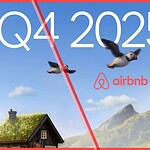Airbnb’s new feature, Connections, signals a push beyond bookings into social networking. But an LGBTQ+ niche player, misterb&b, has already tested this model with its Weere app — offering lessons for Airbnb and the wider short-term rental industry.
Airbnb Gets Social
Airbnb is rolling out Connections, a feature designed to let travelers keep in touch with people they met during past stays or Experiences. The company frames it as a “high-trust social network” anchored in verified travel relationships, not anonymous follows.
CEO Brian Chesky has been explicit: he wants Airbnb to become more than a booking engine. The company’s 2025 roadmap positions Airbnb as a lifestyle platform, embedding loyalty and engagement into every stage of the trip.
But early feedback suggests Connections risks becoming “just another tab” unless it proves relevant to specific traveler segments. Families and business travelers may see little value in adding more social noise to their trips.
The Niche Player That Went First
Airbnb isn’t the first short-term rental platform to experiment with community-driven design. In 2024, misterb&b, the world’s largest LGBTQ+ travel platform with about 1 million listings worldwide, launched Weere, an integrated social network inside its booking app.
Unlike Airbnb, misterb&b built Weere to solve a community-specific need: creating safe, identity-affirming connections for LGBTQ+ travelers. Users can toggle seamlessly between booking and social, with profiles and reviews carrying over automatically.
Weere blends elements of Couchsurfing, Tinder, and Meetup. For some, it means finding travel companions or local guides. For others, it overlaps with dating. The platform also monetizes through weerePLUS, a paid tier offering advanced filters and exclusive events. Adoption has been strong: around 20% of active users subscribe.
Two Different Plays
- Airbnb Connections: Private, cautious, framed as a digital memory log of past trips and relationships. Currently unmonetized.
- misterb&b Weere: Community-first, open-ended, with social as a core reason to return to the app. Monetization already proven.
The contrast highlights a strategic tension: Airbnb’s scale makes it harder to create intimacy, while misterb&b’s niche focus allows for deeper engagement.
Risks: Tinder or Creepy?
Social networking in travel always raises two red flags: dating creepiness and privacy concerns.
- misterb&b embraces the blurred line between dating and community. For its audience, it works.
- Airbnb cannot. With families and mainstream travelers in its core user base, any perception of “Tinder for Airbnb” would damage the brand.
To prevent stalking concerns, Airbnb has limited Connections to a private list visible only to the user. No feeds, no discoverability, no unsolicited requests. It’s a deliberate tradeoff: slower network growth in exchange for higher trust.
Why This Matters for the Industry
For property managers and the wider short-term rental sector, Airbnb’s move is about more than social features. It reflects an effort to tackle three business levers:
- Retention: Guests who maintain travel ties in-app are more likely to book again.
- Engagement: Social features create reasons to open Airbnb between trips.
- Revenue: While not monetized yet, social opens pathways to premium upsells and curated group experiences.
If Connections succeeds, it could shift how platforms compete: not only on inventory and pricing, but also on who owns the traveler’s network of memories and relationships.
The Takeaway
misterb&b’s Weere demonstrates that social networking can thrive in travel when it solves a clear community problem. Airbnb’s challenge is translating that model to a mass audience without drifting into irrelevance or discomfort.
The stakes are high: get it right, and Airbnb could become the Meetup of global travel, embedding loyalty and unlocking new revenue streams. Get it wrong, and Connections may quietly join Airbnb’s list of experiments that never scaled.
For short-term rental managers, the signal is clear: platforms are moving beyond transactions. The battle for future loyalty may depend as much on social ties as on nightly rates.
Thibault Masson is a leading expert in vacation rental revenue management and dynamic pricing strategies. As Head of Product Marketing at PriceLabs and founder of Rental Scale-Up, Thibault empowers hosts and property managers with actionable insights and data-driven solutions. With over a decade managing luxury rentals in Bali and St. Barths, he is a sought-after industry speaker and prolific content creator, making complex topics simple for global audiences.








